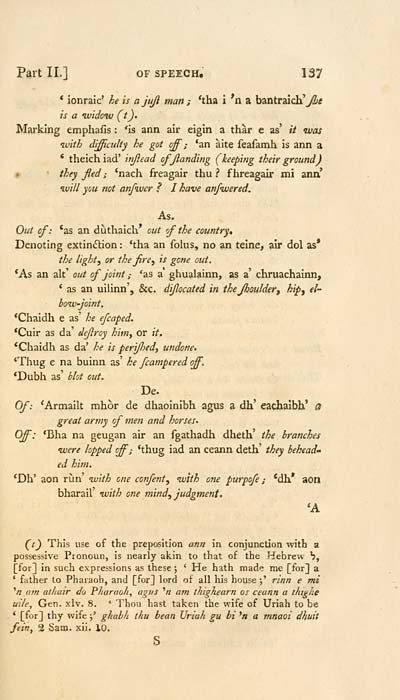Download files
Complete book:
Individual page:
Thumbnail gallery: Grid view | List view

Part II.] OF SPEECH. 137
• ionraic' he is a juji man; 'tha i *n a bantraich'^*
is a luidoiu (t).
Marking emphafis : 'is ann air eigin a thar e as' // was
nvith difficulty he got off ; *an àite feafamh is ann a
' theich iad' injiead ofjianding (keeping their ground)
they fled ; *nach freagair thu ? fhreagair mi ann'
ivill you not anfwer ì I have anfwered.
As.
Out of: 'as an duthaich* cut of the country.
Denoting extinction : *tha an folus, no an teine, air dol as*
the light ^ or the fire ^ is gone out.
*As an alt' out of joint ; *as a' ghualainn, as a' chruachainn,
* as an uilinn', &c. di/located in thefhoulder^ hip^ el-
boiv-joint.
*Chaidh e as' he efcaped.
*Cuir as da' deflroy hinjy or it.
*Chaidh as da' he is perijììed^ undone,
*Thug e na buinn as' he fcampered off.
*Dubh as' blot out.
De.
Of: 'Armailt mhòr de dhaoinibh agus a dh' eachalbh* a
great army of men and horses.
Off: *Bha na geugan air an fgathadh dheth' the branches
were lopped off; *thug iad an ceann deth' they behead"
ed him,
'Dh' aon run' with one confent^ with one purpofe ; 'dh* aon
bharail' with one mind^ judgment,
'A
(t) This use of the preposition ann in conjunction with a
possessive Pronoun, is nearly akin to that of the Hebrew h,
[for] in such expressions as these j ' He hath made me [for] a
• father to Pharaoh, and [for] lord of all his house j' rinn e mi
'« am atliair do Pharaoh, agus '« am thighearn os ceann a thighe
ui/e. Gen. xlv. 8. ' Thou hast taken the wife of Uriah to be
* [for] thy wife j' ghabh thu bean Uriah gu bi '« c mnaoi dhuit
fein, 2 Sam. xii. 10.
s
• ionraic' he is a juji man; 'tha i *n a bantraich'^*
is a luidoiu (t).
Marking emphafis : 'is ann air eigin a thar e as' // was
nvith difficulty he got off ; *an àite feafamh is ann a
' theich iad' injiead ofjianding (keeping their ground)
they fled ; *nach freagair thu ? fhreagair mi ann'
ivill you not anfwer ì I have anfwered.
As.
Out of: 'as an duthaich* cut of the country.
Denoting extinction : *tha an folus, no an teine, air dol as*
the light ^ or the fire ^ is gone out.
*As an alt' out of joint ; *as a' ghualainn, as a' chruachainn,
* as an uilinn', &c. di/located in thefhoulder^ hip^ el-
boiv-joint.
*Chaidh e as' he efcaped.
*Cuir as da' deflroy hinjy or it.
*Chaidh as da' he is perijììed^ undone,
*Thug e na buinn as' he fcampered off.
*Dubh as' blot out.
De.
Of: 'Armailt mhòr de dhaoinibh agus a dh' eachalbh* a
great army of men and horses.
Off: *Bha na geugan air an fgathadh dheth' the branches
were lopped off; *thug iad an ceann deth' they behead"
ed him,
'Dh' aon run' with one confent^ with one purpofe ; 'dh* aon
bharail' with one mind^ judgment,
'A
(t) This use of the preposition ann in conjunction with a
possessive Pronoun, is nearly akin to that of the Hebrew h,
[for] in such expressions as these j ' He hath made me [for] a
• father to Pharaoh, and [for] lord of all his house j' rinn e mi
'« am atliair do Pharaoh, agus '« am thighearn os ceann a thighe
ui/e. Gen. xlv. 8. ' Thou hast taken the wife of Uriah to be
* [for] thy wife j' ghabh thu bean Uriah gu bi '« c mnaoi dhuit
fein, 2 Sam. xii. 10.
s
Set display mode to: Large image | Transcription
Images and transcriptions on this page, including medium image downloads, may be used under the Creative Commons Attribution 4.0 International Licence unless otherwise stated. ![]()
| Early Gaelic Book Collections > Blair Collection > Elements of Gaelic grammar > (169) |
|---|
| Permanent URL | https://digital.nls.uk/79042003 |
|---|
| Description | A selection of books from a collection of more than 500 titles, mostly on religious and literary topics. Also includes some material dealing with other Celtic languages and societies. Collection created towards the end of the 19th century by Lady Evelyn Stewart Murray. |
|---|
| Description | Selected items from five 'Special and Named Printed Collections'. Includes books in Gaelic and other Celtic languages, works about the Gaels, their languages, literature, culture and history. |
|---|

